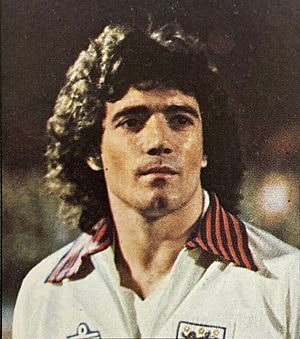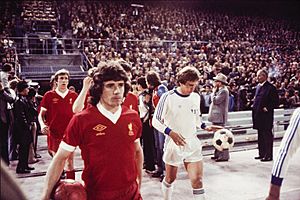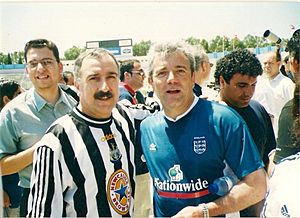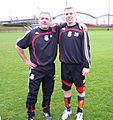Kevin Keegan facts for kids

Keegan playing for England circa 1980
|
|||
| Personal information | |||
|---|---|---|---|
| Full name | Joseph Kevin Keegan | ||
| Date of birth | 14 February 1951 | ||
| Place of birth | Armthorpe, Doncaster, England | ||
| Height | 5 ft 8 in (1.73 m) | ||
| Playing position | Forward | ||
| Youth career | |||
| Enfield House YC | |||
| 1967–1968 | Scunthorpe United | ||
| Senior career* | |||
| Years | Team | Apps† | (Gls)† |
| 1968–1971 | Scunthorpe United | 124 | (18) |
| 1971–1977 | Liverpool | 230 | (68) |
| 1977–1980 | Hamburger SV | 90 | (32) |
| 1980–1982 | Southampton | 68 | (37) |
| 1982–1984 | Newcastle United | 78 | (48) |
| 1985 | Blacktown City | 2 | (1) |
| Total | 592 | (204) | |
| National team | |||
| 1972–1982 | England | 63 | (21) |
| Teams managed | |||
| 1992–1997 | Newcastle United | ||
| 1997–1999 | Fulham | ||
| 1999–2000 | England | ||
| 2001–2005 | Manchester City | ||
| 2008 | Newcastle United | ||
|
|||
Joseph Kevin Keegan OBE (born 14 February 1951) is an English former footballer and manager. A forward, he played for several professional clubs from 1968 to 1984. Widely regarded as one of the greatest players of all time, Keegan was recognised for his dribbling ability as well as his finishing and presence in the air. Having begun his career at Scunthorpe United, he moved to Liverpool in 1971 and then to Hamburger SV in 1977, enjoying great success at both clubs. During this period, he was a regular member of the England national team. After leaving Hamburg, where he was affectionately known as 'Mighty Mouse', Keegan played for Southampton and Newcastle United before retiring. Keegan returned to football in 1992 as manager at Newcastle. He later managed Fulham and Manchester City. All three clubs he managed won promotion as champions in his first full season there. He managed the England national team from 1999 to 2000.
Contents
Early years
Keegan's paternal ancestors arrived in Newcastle from [[Republic of Ireland|Ireland. In 1909, his grandfather Frank, an inspector, heroically saved lives in the West Stanley Pit disaster. His father Joe and uncle Frank were Newcastle United fans, describing their favourite players as Hughie Gallacher and Jackie Milburn. His father moved to Armthorpe in Doncaster to work in a colliery, where he married Doris and they had three children: Mary, who was two years Keegan's senior, Kevin, and Michael. His father never saw Keegan play for Newcastle.
Keegan was born at his aunt Nellie's house in Elm Place in Armthorpe. His aunt's house was chosen as she had electricity that made it safer for childbirth. Keegan attended St. Peter's High School in nearby Cantley.
Keegan was given his first football by his uncle Frank and his first pair of football boots by his father after he had a win on the horses. Keegan played football at Hyde Park using his baby brother Michael's pushchair as a goal post. As a boy he supported Doncaster Rovers. His favourite player was Alick Jeffrey, a player, once described by Matt Busby's assistant Jimmy Murphy as the English Pelé, and once described by Jackie Milburn as "the best young player he had ever seen". As a schoolboy, Keegan had a trial for Coventry City, under manager Jimmy Hill. Despite being one of two players kept on for an extra six-week period, the club did not offer Keegan a contract, though they did offer apprenticeship terms to the right-back Brian Joy who also went on to have a 15-year career in football. Keegan also had a trial with Doncaster Rovers, arranged by his father, but when Keegan arrived, he found out he had been given the wrong information and the trial was earlier in the day and at a different place.
Keegan participated in various sports, such as cross country running, rugby, football, and even captaining his school's cricket team. He also boxed at his local club, run by the former British Heavyweight champion Bruce Woodcock. At age 15, Keegan, with two friends, completed a 50-mile run from Nottingham to Doncaster. Keegan left school with O Levels in History and Art.
At the age of 15 Keegan started work at Pegler Brass Works as an office clerk; though he has stated that he was more of a tea boy and messenger than an office clerk. Whilst working at Pegler, Keegan continued playing Saturday afternoon football for his local youth club, Enfield House, and playing Sunday morning football for the Lonsdale Hotel. It was during this time that a colleague, named Harry Holland, invited him to play for the Peglers Works reserves on a Saturday morning. His chance at professional football came when he was playing Sunday morning league football for the Lonsdale Hotel in a match against Woodfield Social in 1966. Keegan was marked by a player in his mid 30s, called Bob Nellis. After playing against Keegan, Nellis became impressed by the ability of Keegan and offered him a trial at Fourth Division side Scunthorpe United – one of just two professional sides in the division. This trial would lead to the Scunthorpe manager Ron Ashman giving Keegan his first contract in professional football.
Club career
Keegan began his playing career at Scunthorpe in 1968, before Bill Shankly signed him for Liverpool. There he won three First Division titles, the UEFA Cup twice, the FA Cup and, in his final season, the European Cup. Keegan gained his first England cap in 1972. He moved to Hamburg in the summer of 1977 and was named European Footballer of the Year in both 1978 and 1979. Hamburg won the Bundesliga title in 1978–79 and reached the 1980 European Cup Final. Keegan left Hamburg and played at Southampton for two seasons before transferring to Newcastle United in the Second Division in 1982. He helped Newcastle secure promotion in his second season, and retired from playing in 1984.
In April 1985, Keegan briefly came out of retirement to play a two-game stint as a guest player for Blacktown City in Australia's National Soccer League. He scored in the first fixture in a 3–2 loss to Canberra City. He scored 204 goals in 592 appearances in his club career, adding 21 goals in 63 caps for the English national team.
International career
Keegan made his England debut on 15 November 1972 in a 1–0 World Cup qualifying win over Wales. Keegan managed only two appearances during this campaign, both against Wales, as England failed to qualify for the 1974 FIFA World Cup.
He scored his first international goal in his third appearance, also against Wales, on 11 May 1974. He was given the captaincy by manager Don Revie in 1976 after Gerry Francis fell victim to a long-term injury. He went on to captain England 31 times, retaining the captain's armband until his international retirement after the 1982 World Cup.
Keegan captained England at Euro 1980. England failed to progress from the group stage after finishing third in their group behind Italy and Belgium.
He managed only one World Cup appearance, as England failed to qualify for both the 1974 and 1978 tournaments. He finally reached the World Cup in 1982 in Spain. He was named in the squad for the tournament, but was suffering from a chronic back injury and was unfit to play in any of England's group games. In a last desperate effort to play in a World Cup—knowing that he would not be around for the 1986 competition—he secretly hired a car and drove from Spain to a specialist he knew in Germany for intensive treatment. He recovered sufficiently to appear as a substitute for the last 26 minutes of England's second-round game against Spain. While on the pitch, he missed a point-blank header which would have put England ahead. England needed to win by a scoreline better than 2–1 to progress to the semi-finals (a 2–1 victory would have left them tied with West Germany). England drew the game 0–0 and were eliminated from the competition.
Following the successful start to the 1982–83 season with Newcastle United, there was much controversy when newly appointed England manager Bobby Robson did not select Keegan for his first squad, a decision Keegan learned of from the media rather than Robson himself. Keegan publicly expressed his displeasure at not being given the courtesy of a phone call from Robson, and never played for his country again. He finished his international career with 63 caps and 21 goals.
Managerial career
Keegan moved into management at Newcastle in 1992, and the team won promotion to the Premier League as First Division champions in his first full season, the following year. Newcastle finished second in the Premier League in 1995–96, after leading for most of the season. After managing Fulham for two seasons, he took charge of the England team in February 1999, but resigned in October 2000 following a 1–0 loss against Germany in qualification for the 2002 FIFA World Cup. In 2001, he became manager of Manchester City for four years until he resigned in 2005. Keegan had been out of football for almost three years when he returned to Newcastle United for a second spell as manager in January 2008, but this lasted only eight months, as he resigned on 4 September 2008 following speculation about a dispute with the club's directors.
Personal life
In September 1970 Keegan met his future wife, Jean Woodhouse, on the Waltzers at Doncaster fair. They married on 23 September 1974 and have two daughters.
Keegan became renowned for his "poodle perm" hair in the 1970s, and has regularly appeared at the top of "worst hairstyles" surveys.
In July 2008, Flybe International announced the naming of one of their new Bombardier Q400 aircraft in honour of Keegan's service to Newcastle United, both as a player and as manager. The plane was used on the regular service from Newcastle International Airport to London's Gatwick Airport.
He is known for aiding charities, including appearances at cricket matches for Lord's Taverners and Sussex Cricket Club.
Television
In 1976, Keegan competed in the BBC's television programme Superstars. Despite suffering severe cuts after crashing his bicycle, he insisted on re-racing and secured second place in the event, before going on to win that edition of the programme. He also advertised Brut aftershave alongside boxer Henry Cooper.
In 1979 Keegan and his wife were featured on ITV's "Brian Moore meets Kevin Keegan," a documentary filmed over the course of the season. Cameras documented activities at the family's Hamburg home and Keegan's personal business appearances, offering a rare glimpse into the life of a modern millionaire footballer away from the pitch.
He narrated the 90-minute documentary Keegan on Keegan, released via Castle Vision on VHS cassette in 1992.
In August 2009, nearly a year after his departure from Newcastle, Keegan resurfaced after being confirmed as the lead pundit on ESPN. During the course of the 2010 World Cup, Keegan featured as a pundit for ITV broadcasts. He was part of ESPN's live coverage of the 2011, 2012 and 2013 FA Cup finals, with pitch-side build-up and post-match commentary.
Music
Keegan released a single in 1972 titled "It Ain't Easy". His song "Head Over Heels in Love", written by Chris Norman and Pete Spencer, was released on 9 June 1979. It peaked at number 31 in the UK charts, but climbed to number 10 in Germany where Keegan was based at the time, and where Norman's band Smokie was popular. He released another single, "England", on his return to England from Germany, but it failed to chart.
Career statistics
Club
| Club | Season | League | National Cup | League Cup | Continental | Total | ||||||
|---|---|---|---|---|---|---|---|---|---|---|---|---|
| Division | Apps | Goals | Apps | Goals | Apps | Goals | Apps | Goals | Apps | Goals | ||
| Scunthorpe United | 1968–69 | Fourth Division | 33 | 2 | 1 | 0 | 1 | 0 | 0 | 0 | 35 | 2 |
| 1969–70 | 46 | 6 | 7 | 3 | 1 | 0 | 0 | 0 | 54 | 9 | ||
| 1970–71 | 45 | 10 | 6 | 0 | 1 | 1 | 0 | 0 | 52 | 11 | ||
| Total | 124 | 18 | 14 | 3 | 3 | 1 | 0 | 0 | 141 | 22 | ||
| Liverpool | 1971–72 | First Division | 35 | 9 | 3 | 2 | 1 | 0 | 3 | 0 | 42 | 11 |
| 1972–73 | 41 | 13 | 4 | 0 | 8 | 5 | 11 | 4 | 64 | 22 | ||
| 1973–74 | 42 | 12 | 9 | 6 | 6 | 1 | 4 | 0 | 61 | 19 | ||
| 1974–75 | 33 | 10 | 2 | 1 | 3 | 0 | 3 | 1 | 41 | 12 | ||
| 1975–76 | 41 | 12 | 2 | 1 | 3 | 0 | 11 | 3 | 57 | 16 | ||
| 1976–77 | 38 | 12 | 8 | 4 | 2 | 0 | 8 | 4 | 56 | 20 | ||
| Total | 230 | 68 | 28 | 14 | 23 | 6 | 40 | 12 | 321 | 100 | ||
| Hamburger SV | 1977–78 | Bundesliga | 25 | 6 | 4 | 4 | – | 4 | 2 | 33 | 12 | |
| 1978–79 | 34 | 17 | 1 | 0 | – | – | 35 | 17 | ||||
| 1979–80 | 31 | 9 | 3 | 0 | – | 9 | 2 | 43 | 11 | |||
| Total | 90 | 32 | 8 | 4 | 0 | 0 | 13 | 4 | 111 | 40 | ||
| Southampton | 1980–81 | First Division | 27 | 11 | 4 | 1 | 1 | 0 | 0 | 0 | 32 | 12 |
| 1981–82 | 41 | 26 | 1 | 1 | 2 | 1 | 4 | 2 | 48 | 30 | ||
| Total | 68 | 37 | 5 | 2 | 3 | 1 | 4 | 2 | 80 | 42 | ||
| Newcastle United | 1982–83 | Second Division | 37 | 21 | 2 | 0 | 2 | 0 | 0 | 0 | 41 | 21 |
| 1983–84 | 41 | 27 | 1 | 0 | 2 | 1 | 0 | 0 | 44 | 28 | ||
| Total | 78 | 48 | 3 | 0 | 4 | 1 | 0 | 0 | 85 | 49 | ||
| Blacktown City | 1985 | National Soccer League | 2 | 1 | – | – | – | 2 | 1 | |||
| Career total | 592 | 204 | 58 | 23 | 33 | 9 | 57 | 18 | 740 | 254 | ||
International
| National team | Year | Apps | Goals |
|---|---|---|---|
| England | 1972 | 1 | 0 |
| 1973 | 1 | 0 | |
| 1974 | 7 | 2 | |
| 1975 | 8 | 2 | |
| 1976 | 9 | 2 | |
| 1977 | 8 | 2 | |
| 1978 | 6 | 3 | |
| 1979 | 8 | 5 | |
| 1980 | 6 | 3 | |
| 1981 | 5 | 1 | |
| 1982 | 4 | 1 | |
| Total | 63 | 21 | |
- Scores and results list England's goal tally first, score column indicates score after each Keegan goal.
| No. | Date | Venue | Opponent | Score | Result | Competition |
|---|---|---|---|---|---|---|
| 1 | 11 May 1974 | Ninian Park, Cardiff | 2–0 | 2–0 | 1974 British Home Championship | |
| 2 | 5 June 1974 | Stadion FK Crvena Zvezda, Belgrade | 2–2 | 2–2 | Friendly | |
| 3 | 11 May 1975 | Tsirion Stadium, Cyprus | 1–0 | 1–0 | Euro 1976 qualifier | |
| 4 | 3 September 1975 | St. Jakob-Park, Basel | 1–0 | 2–1 | Friendly | |
| 5 | 13 June 1976 | Helsinki Olympic Stadium, Helsinki | 2–1 | 4–1 | 1978 World Cup qualifier | |
| 6 | 4–1 | |||||
| 7 | 30 March 1977 | Wembley Stadium, London | 1–0 | 5–0 | 1978 World Cup qualifier | |
| 8 | 16 November 1977 | Wembley Stadium, London | 1–0 | 2–0 | 1978 World Cup qualifier | |
| 9 | 19 April 1978 | Wembley Stadium, London | 1–1 | 1–1 | Friendly | |
| 10 | 20 September 1978 | Parken Stadium, Copenhagen | 1–0 | 4–3 | Euro 1980 qualifier | |
| 11 | 2–0 | |||||
| 12 | 7 February 1979 | Wembley Stadium, London | 1–0 | 4–0 | Euro 1980 qualifier | |
| 13 | 26 May 1979 | Wembley Stadium, London | 3–1 | 3–1 | 1979 British Home Championship | |
| 14 | 6 June 1979 | Vasil Levski National Stadium, Sofia | 1–0 | 3–0 | Euro 1980 qualifier | |
| 15 | 13 June 1979 | Praterstadion, Vienna | 1–2 | 3–4 | Friendly | |
| 16 | 12 September 1979 | Wembley Stadium, London | 1–0 | 1–0 | Euro 1980 qualifier | |
| 17 | 6 February 1980 | Wembley Stadium, London | 1–0 | 2–0 | Euro 1980 qualifier | |
| 18 | 2–0 | |||||
| 19 | 13 May 1980 | Wembley Stadium, London | 3–1 | 3–1 | Friendly | |
| 20 | 6 June 1981 | Népstadion, Budapest | 3–1 | 3–1 | 1982 World Cup qualifier | |
| 21 | 23 February 1982 | Wembley Stadium, London | 2–0 | 4–0 | 1982 British Home Championship |
Managerial statistics
| Team | From | To | Record | ||||
|---|---|---|---|---|---|---|---|
| G | W | D | L | Win % | |||
| Newcastle United | 5 February 1992 | 8 January 1997 | 251 | 138 | 51 | 62 | 54.98 |
| Fulham | 7 May 1998 | 9 May 1999 | 61 | 38 | 12 | 11 | 62.30 |
| England | 18 February 1999 | 7 October 2000 | 18 | 7 | 7 | 4 | 38.89 |
| Manchester City | 24 May 2001 | 11 March 2005 | 176 | 77 | 39 | 60 | 43.75 |
| Newcastle United | 16 January 2008 | 4 September 2008 | 22 | 7 | 6 | 9 | 31.82 |
| Total | 528 | 267 | 115 | 146 | 50.57 | ||
Honours
Player
- Source:
Liverpool
- Football League First Division: 1972–73, 1975–76, 1976–77
- FA Cup: 1973–74
- FA Charity Shield: 1974, 1976
- European Cup: 1976–77
- UEFA Cup: 1972–73, 1975–76
Hamburg
- Bundesliga: 1978–79
- European Cup Runner up: 1979-80
England
- British Home Championship: 1979, 1982
Individual
- Ballon d'Or: 1978, 1979
- kicker Bundesliga Team of the Season: 1977–78, 1978–79, 1979–80
- Inducted into the inaugural English Football Hall of Fame in 2002.
- Named 8th on the Liverpool FC list of 100 Players who shook the Kop.
- FWA Footballer of the Year: 1975–76
- PFA Players' Player of the Year: 1981–82
- FIFA 100
- Onze d'Argent: 1976, 1980
- Onze d'Or: 1977, 1979
- North-East FWA Player of the Year: 1983, 1984
- Newcastle United Player of the Year: 1982–83, 1983–84
Manager
Newcastle United
- Football League First Division: 1992–93
Fulham
- Football League Second Division: 1998–99
Manchester City
- Football League First Division: 2001–02
Individual
- Premier League Manager of the Month: November 1993, August 1994, February 1995, August 1995, September 1995
Images for kids
-
Keegan managing Newcastle United in April 2008
See also
 In Spanish: Kevin Keegan para niños
In Spanish: Kevin Keegan para niños






